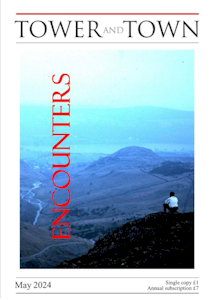

Tower and Town, May 2024 (view the full edition) (view the full edition)A Good ReadWhile I'm slightly dubious about, and frankly weary of the trend to re-write (mostly) Greek myths "giving a voice to the previously overlooked and misrepresented women of the ancient world" (pause while I retrieve my eyeballs which have rolled so far to the back of my head that they've stuck), that doesn't mean I'm not happy to read historical novels set in the ancient world. No, sirree. Especially when the ancient world depicted is Lindsey Davis's Rome. I think I wrote before Christmas that I was looking forward to reading Voices of Rome, and now I have done and am here to press it on you. It's not that the female characters haven't been under- or mis-represented of course, but different times, folks, different culture, different mores. Lindsey Davis's great skill is in making her characters (women and men) relatable, while effortlessly evoking the obvious differences between first-century Rome and us, here and now. Voices of Rome is a collection of four novellas. Those readers who know the Falco and Flavia Albia books will recognise many of the characters and the author's combination of humour and acute insight into human nature, treating serious matters seriously, but maintaining an engaging lightness of touch. The most sombre story is Vesuvius by Night. The author's website, and the introduction to this book tell us that she has been reluctant to write about the eruption of the volcano and the destruction of Pompeii and Herculaneum, feeling that it's not a subject for her more light-hearted narratives. She's right of course. She gives us characters we know and care about, so her vivid description (drawing on Pliny) of their fate reminds us that the excavated city, now a tourist attraction, is in fact the grave site of real people with everyday messy and mundane lives and families and businesses. Invitation to Die entertainingly describes the genuine horror of being summoned to a banquet by the Emperor Domitian (terrible food and the very real possibility of being murdered), and The Bride from Bithynia is set during the Boudiccan revolt in Britain, in the rain...The lightest of the four stories is narrated by Postumus, an inspired Ancient Roman hybrid of William Brown and Adrian Mole, funny and touching, and leaving a trail of confusion in his wake. Fans of Davis will be delighted with these little treats, new readers may well become fans on the strength of this book. Debby Guest |